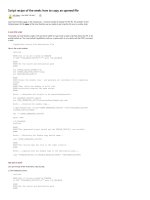How to code .NET - Introduction
Bạn đang xem bản rút gọn của tài liệu. Xem và tải ngay bản đầy đủ của tài liệu tại đây (114.09 KB, 1 trang )
Introduction
T
he title of this book may seem odd; you probably already know how to write code in .NET.
But you can always benefit from knowing more. Coders, architects, and developers always
strive to do their best, and if given the choice to do something correctly or incorrectly they will
do it correctly. So why do we have so many bugs in our code? I could say, “Heck, it’s all the
managers making bonehead decisions.” It would be a popular answer, but it would not be
fair. We have bugs because humans and the communication between humans are imperfect.
The other major reason why code has bugs is that people do not have the time or energy
to pour resources into specific problems. When you are working on an application, you are
confronted with thousands of specific problems, and you have to assign a priority. This is
where this book is aimed. I take the time to investigate the specific problems and figure
out how to solve them. Your responsibility is to read the solutions and implement them as
appropriate.
This is not a patterns book, even though I reference patterns. It is not a book meant to solve
all problems, because like you I have to assign priority to the problems I want to solve. This book
is the first of a series, and subsequent volumes will solve more problems. This book aims to
look at a problem, feature, or fact and then figure out what that problem, feature, or fact implies.
As a quick example .NET 2.0 introduced the yield keyword. Cool use of technology, but
what does yield really imply? Is yield buggy? Is yield the future of all iterators? After reading
this book you’ll know all of yield’s implications and ramifications.
If you read this book and disagree with me, let me know why you disagree. Tell me what
you think I did wrong. Sometimes I will correct you, but other times, we’ll both learn some-
thing. Or if you want me to figure out a solution to a specific problem you are having, tell me.
If I end up writing about our discussion, I will credit you and give you a free copy of my next
book. Send your love or hate to
Source Code
The source code is available in the Source Code/Download section of the Apress website
(). Additionally, you can visit />to download the code.
xiii
7443FM.qxd 9/21/06 10:46 PM Page xiii









